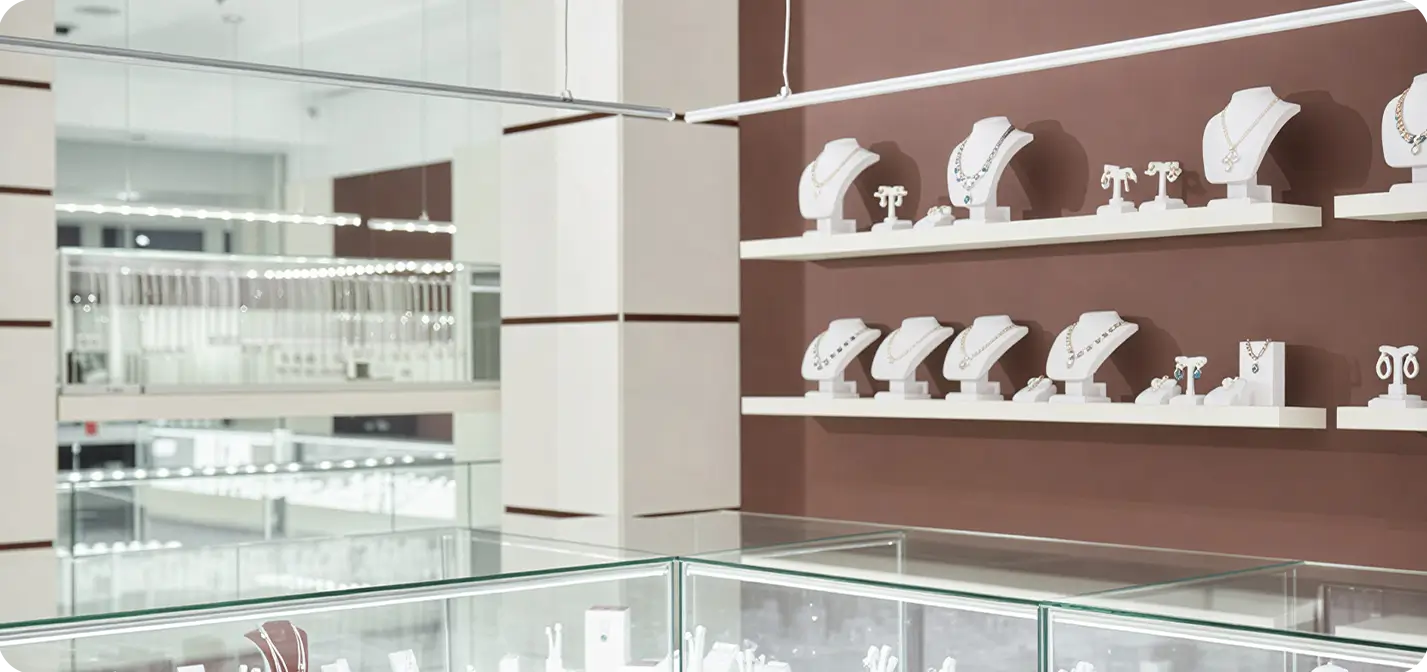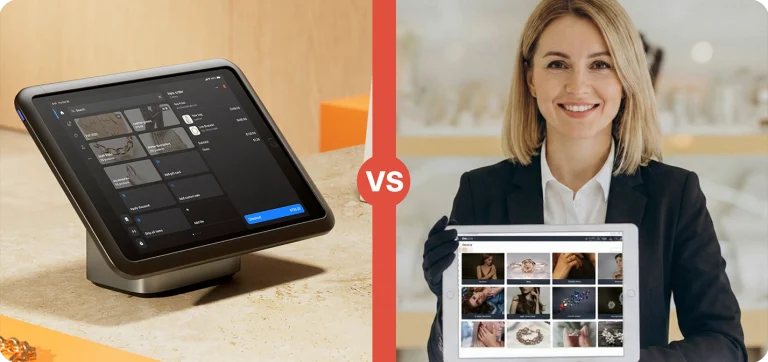

A customer walks into your jewelry store asking for an update on the custom diamond pendant she ordered as a birthday surprise. You flip through a stack of job envelopes, scroll through emails from your bench jeweler, and dig through a spreadsheet saved as Final_Final_Inventory_v3.xlsx, still no answer.
Before you can find it, the phone rings. It’s someone asking for a repair status. At the same moment, another customer walks in to buy a wedding band, but your system can’t tell you their ring size from a previous purchase. You’re losing time, losing patience, and maybe even losing the sale.
This is the daily chaos of running a jewelry business without the right system.
Jewelry stores don’t operate like clothing boutiques or electronics shops. You deal with high-value inventory, special orders with emotional significance, genuine craftsmanship, and customers who expect precision and trust.
Yet many jewelers still try to run their business on generic POS systems, Excel sheets, or paper job bags, tools never designed to track diamonds by carat, manage custom design workflows, or follow repair jobs through production.
There’s a better way.
A dedicated jewelry point of sale (POS) system brings order to the chaos, connecting sales, inventory, custom jobs, pricing, CRM, and workshop tracking into one smooth workflow.
In this guide, we reveal the top jewelry POS systems every serious jewelry retailer should consider, and which one stands out as the #1 choice for modern jewelers who want to scale efficiently without losing control.
1. What Makes a Jewelry-Store POS Truly Great?
Before diving into the list, here are the key features you should look for in a POS system designed for jewellery retail:
- Inventory management tailored to jewellery: Ability to track individual gemstones/diamonds (cut, colour, clarity, carat), precious-metal fluctuations, raw material to finished piece workflow.
- Repair & custom-order workflow: From consultation through workshop to delivery. Real-time status updates, customer notifications, full work-order history.
- Advanced CRM & customer data: Remember anniversaries, preferences, past purchases, custom-design history. Create personalised journeys.
- Security & compliance: High-value transactions demand strong encryption, PCI compliance, fraud detection.
- Insights & reporting for jewellery: Know which designs move fastest, seasonal gem trends, best margins on precious-metal pieces.
- Integrations: E-commerce platforms, appraisal systems, insurance partners, multi-location sync if needed.
With those in mind, let’s explore the top solutions.
1. PIRO Retail (Best Overall for Jewellery Stores)
PIRO Retail is the most complete jewelry POS system on the market today. Unlike generic retail software or lightweight POS systems, PIRO Retail was designed exclusively for the jewelry industry, combining point of sale, inventory control, repairs, job tracking, and customer management into one powerful platform.
What makes PIRO Retail different is its ability to handle both retail jewelry operations and complex custom workflows. Whether you sell finished jewelry, diamond engagement rings, or run a full-service workshop offering repairs and bespoke designs, PIRO Retail gives you full process control from the sales floor to the bench.
Why PIRO Retail Leads the Industry
- Built specifically for jewelry retailers
- Advanced inventory management with metal and gemstone attributes
- Real-time job tracking for custom orders and repairs
- Smart pricing using metal market updates and labor cost tracking
- Full CRM for customer history, preferences, and lifetime value
- Cloud-based system for multi-store access and remote management
- Scalable for businesses of any size, from boutique to multi-location
Best For: Jewelry retailers who want total business control – retail + repairs + custom jobs + production – in a single professional platform built for the jewelry industry.
Pricing: 169 $/month/ POS user.
2. Jewel360 (Good for Simple Retail + E-commerce Integration)
Jewel360 is a cloud-based POS system built for jewelry retailers. Compared to generic POS tools, it does offer jewelry-specific features like repair tracking and vendor management. However, it’s primarily geared toward retail-focused stores that don’t require deep inventory control or advanced custom job workflows.
Where Jewel360 Performs Well
- Clean, user-friendly interface that’s easy to learn
- Built-in online store functionality for selling jewelry online
- Basic repair and special order tracking
- Customer profiles and sales history
- Marketing tools like automated messages and reminders
Pricing: Pricing is not listed publicly. You must request a custom quote using their online pricing tool.
3. The Edge for Jewelers (For Advanced CRM and Custom Workflows)
The Edge is one of the most well-known jewelry POS systems on the market, especially among traditional brick-and-mortar jewelers. It offers tools for managing customer information, in-store sales, and basic reporting. The software also includes functions such as repair tracking, appraisals, layaways, memo management, and vendor tracking.
The Edge is installed locally on a computer rather than accessed online. This setup may work well for stores that prefer offline software, but it can be less convenient for users who need remote access or plan to manage multiple store locations.
Where The Edge Performs Well
- CRM that tracks detailed customer purchase history
- In-store sales tools like layaways, appraisals, and wishlists
- repair and service tracking
- Robust reporting and KPI monitoring
- Widely used in the jewelry industry and supported by many consultants
Pricing: One-time license fee starting at $4,600 for a single store. Multi-store packages start at $12,450.
4. Crystal POS (Good Smaller Jewellery Operations or Kiosks)
Crystal POS is a simple and affordable jewelry point of sale system designed for small jewelry businesses, mall kiosks, and independent boutique retailers. It includes basic jewelry inventory fields and sales features but stays lightweight and easy to use, ideal for small teams who don’t need complex workflows.
It covers essential jewelry operations like barcode labeling, product categories, and simple repair tickets. However, it doesn’t offer advanced gemstone tracking, custom manufacturing workflows, or detailed job management, which limits its usefulness for growing or full-service jewelry retailers.
Where Crystal POS Performs Well
- Easy setup and user-friendly interface
- Budget-friendly pricing
- Basic inventory management designed for jewelry
- Barcode label printing support
- Cloud-based with multiple device access
Pricing: Custom pricing available upon inquiry.
5. CaratIQ (Best for Sales Reporting & Analytics)
CaratIQ is a jewelry-focused POS system that includes reporting and sales analysis features. It allows jewelry store owners to view sales trends, monitor product performance, and review staff activity. The system provides basic tools for understanding store performance through data.
CaratIQ is mainly designed for retail jewelry sales and does not include advanced options for managing repairs, special orders, or custom jewelry production. Its inventory management works for standard products but may not be detailed enough for businesses that handle loose stones or multi-step manufacturing processes.
Where CaratIQ Performs Well
- Strong sales and product performance analytics
- KPI dashboards for better business decisions
- Customizable sales reports by staff, item, or category
- Good inventory visibility for retail jewelry
- Multi-store reporting capabilities
Pricing: Subscription plans start at $300 per month. Total cost varies based on selected modules.
How to Choose the Right One for Your Store
Selecting a POS system is a strategic investment. Here are some guiding questions:
- What’s your store size / growth ambition? Boutique vs multi-unit?
- How complex is your inventory and services? Do you track gemstones and metals? Do you perform custom orders and repairs?
- What channels do you sell through? In-store only, store + online, or predominantly online?
- What are your CRM and customer-loyalty needs? Are you focusing on high-value repeat clients, custom work, anniversaries?
- How much data/analytics do you need? Do you want to optimise based on trends in gemstones, precious metals, or purely basic sales?
- Budget & timing: What’s your budget for setup/licensing? How fast can you migrate to a new system without disrupting business?
Next step: Schedule demos with the top contenders and walk through your actual workflows, from a client custom-order consult to bench work to final delivery. That will reveal which system truly aligns with your business.
Final toughts
Running a successful jewelry business requires more than a standard retail checkout system, it demands precision, traceability, and total control over inventory, custom jobs, repairs, and customer relationships. That’s why choosing a POS built specifically for jewelers isn’t just smart, it’s essential for growth and profitability.
While every solution on this list serves the jewelry industry, not all of them go deep enough into the real operational needs of modern jewelers, especially when it comes to custom manufacturing, repair workflows, pricing transparency, and gemstone-level inventory management.
If you’re looking for the most complete jewelry POS system, one that handles everything from retail to repairs to special orders to production, the clear leader is PIRO Retail.
It doesn’t just manage your store. It transforms your business. Book a personalized consultation here.
Frequently asked questions about PIRO Retail jewelry POS
- What makes PIRO Retail different from regular POS systems?
PIRO Retail is built specifically for the jewelry industry, not for general retail. It handles everything from gemstone tracking and metal pricing to repair management and custom-order workflows. Unlike generic POS systems, it connects your sales, inventory, CRM, and workshop processes into one smooth, cloud-based solution. - Can PIRO Retail manage both retail sales and custom jewelry production?
Yes. PIRO Retail is designed for both sides of a jewelry business, front-end retail and back-end production. It helps you track custom orders, monitor repairs in real time, and manage every step of the design and manufacturing process, ensuring transparency and efficiency from consultation to delivery. - Is PIRO Retail suitable for small jewelry stores, or only large operations?
PIRO Retail is scalable. Whether you run a single boutique or manage multiple locations, it adapts to your business size. Smaller stores can use it for efficient sales, inventory, and repair tracking, while larger retailers benefit from advanced reporting, CRM, and multi-store management features. - How does PIRO Retail help improve customer satisfaction?
By keeping all customer data and job details in one place, PIRO Retail ensures you never lose track of an order or repair again. It allows you to give instant status updates, remember purchase histories and preferences, and deliver a more personalized service—building stronger trust and loyalty with your customers.

